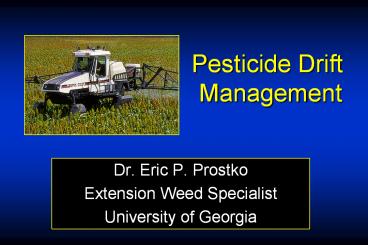Pesticide Drift Management - PowerPoint PPT Presentation
Title:
Pesticide Drift Management
Description:
... Physical Drift Spray Volume most effective means to increase spray volume is to increase nozzle orifice size i.e. 8002 vs. 8003 vs. 8004 Vapor Drift the ... – PowerPoint PPT presentation
Number of Views:167
Avg rating:3.0/5.0
Title: Pesticide Drift Management
1
Pesticide Drift Management
- Dr. Eric P. Prostko
- Extension Weed Specialist
- University of Georgia
2
Pesticide Drift ManagementTopics For Discussion
- definition
- types of drift
- factors affecting drift
- equipment
- management
3
What is pesticide drift??
- the movement of the pesticide away from the
target area. - physical drift
- vapor drift
4
Spray drift is undesirable!!
- inefficient use of equipment and time
- under-application/ineffective control
- litigation concerns
- unintentional contamination of foodstuffs
- air/water pollution
- livestock and human health/safety
5
Corn and Grain Sorghum Yield Loss From Simulated
Staple Drift, College Station, 1994.
Applied 30 DAP
6
Physical Drift
- movement of pesticide away from target during
application - droplet size
- boom height
- weather
7
Studies have shown that equipment and its
operation are responsible for 68-90 of the
physical drift problems while weather accounts
for 10-32.
D. B. Smith et al., 1982
8
Physical DriftDroplet Size
- measured in microns
- hair - 50 microns
- 20-370 micron range
- 200 micron average
- smaller drops increase drift potential (lt 100)
9
Fall Rate of Various Size Droplets
10
Relationship of Particle Size to Drift
Based upon 10 fall in 3 MPH winds
11
Physical DriftDroplet Size
- nozzle selection
- Drift Guard Nozzles
- reduces volume of
- droplets below 200
- microns up to 65
- Raindrop Nozzles
- 0.7 - 200 microns
- or less
12
Physical DriftSpray Boom Height
Spacing
Easy and inexpensive
Wide-angle nozzles can be placed lower to the
ground but also produce smaller droplets.
13
Physical DriftWeather
- wind speed/direction
- most important
- temperature
- humidity
- inversions
14
Physical DriftTemperature Inversions
Normal
Inversion
15
Physical DriftOther Factors to Consider
- nozzle orientation
- spray pressure
- spray volume
16
Physical DriftNozzle Orientation
- ground speeds gt 10 MPH
- 450 or more from perpendicular
30 lt 100 microns
88 lt 100 microns
17
Influence of Spray Pressure on Droplet SizeFlat
Fan Nozzle - 0.6 GPM
18
Physical DriftSpray Volume
- most effective means to increase spray volume is
to increase nozzle orifice size - i.e. 8002 vs. 8003 vs. 8004
19
Vapor Drift
- the volatilization or evaporation of a pesticide
from the soil or crop surface that occurs after
application. - Factors that influence vapor drift include
- vapor pressure/volatility
- temperature
- wind speed
20
Vapor drift can occur even days after the
application
Wind
Drift
Vapor
Non-Target Sensitive Crop
21
Vapor Pressure Values of Various Chemicals_at_ 770F
Note The higher the number the more volatile the
chemical.
22
Pesticide Drift ManagementEquipment Modifications
- shielded spray boom
- covered boom
- hooded-sprayers
- air-assist systems
- electrostatic spraying
23
Pesticide Drift ManagementDrift Control Agents
- thickeners
- increase droplet size of pesticide/water mixes
- 0.10-1.00/A
- 38F, Anchor, Array, Border, Chem-Trol, Corsair,
Direct, Drifgon, Driftgard, Drop Zone, Get Down,
Lo-Drift, More, Nalcotrol, Submerge, Sta-Put,
Windfall
24
Drift Fallout As Influenced By Pressure and
Nalcotrol
Source W. Bowers. 1975. Ohio State Univ.
Extension, Facts 1203.
25
Top 10 Tips For Reducing Pesticide Drift
- nozzle selection
- reduce pressure
- lower boom height
- increase nozzle size
- avoid spraying when winds exceed 10 MPH
- lookout for inversions
- use additives
- calibrate sprayer
- keep records
- use common sense
26
References used in the development of this slide
set include the following
- Reducing Spray Drift. Ohio State Univ.
Extension Bulletin 816, H. Erdal Ozkan. - Herbicide Application Management. Sandoz Crop
Protection, 1993.































